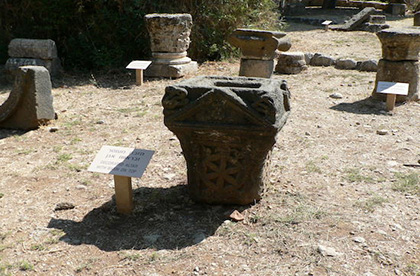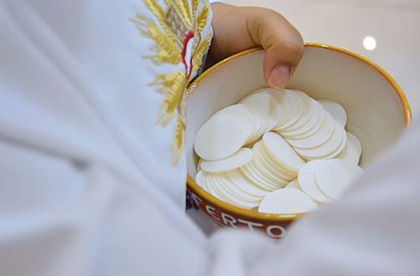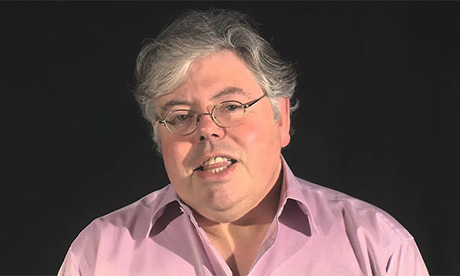In everyday life, our experience tells us – unconsciously – when it is appropriate to use the verb ‘to give’ and when it is appropriate to use ‘to share.’
So we might ask someone to ‘please give me that book lying there’ or ‘I gave him the money’ or ‘she should give that form to … ‘ or ‘give that pot a stir.’
On the other hand, ‘we share tasks between us,’ we offer to share burdens in the hope of halving them, and, most significantly, in English, sharing is the verb used of food items divided between people: ‘shall we share that last piece?’
A moment’s reflection on these two verbs shows that, while the different usages may seem trivial, they make very different assumptions about our relationships with those to whom we give things and with whom we share things.
Giving something assumes ownership in some way or other, and then its transfer.
I have something, and I give it to you. You have something and you are prepared to give it to me. What was once in the domain, power and possession of one person, is transferred to another as a gift, an exchange, or as of right.
The demand ‘Give me my due, I have a right to it!’ could not easily be rephrased in terms of sharing.
Eucharist is an action of the whole Church
By contrast, sharing assumes that ownership and control is common between all involved.
It is because it is ours – not mine or yours – that we share it.
It is ours to start with, and it remains ours. And to make it solely mine or for you to take it as yours would be to act inappropriately.
However, while neither you nor I can take it all, we can both have all that we should have: shares.
Sharing assumes that our rights are held in common and respecting each other is essential to our relationship. While actions of giving and taking merely suppose ordered neutrality, or some force acting as the defender of the peace, sharing presupposes society.
Every act of sharing further develops and enhances our society.
We can see that the distinction between ‘giving’ and ‘sharing’ maps exactly on to the distinction made by theologians between ‘a contract’ (in essence a treaty and a vehicle for commerce) and ‘a covenant’ (in essence a relationship often imagined, as in the prophet Hosea, in terms of marriage imagery).
Likewise, the relationship of human religion with the divine can be seen in terms of ‘deals,’ whereby we trade with the gods for safety and success: humans give to the gods something the gods want; then, in return, the gods give people what the people want.

The exact opposite to this notion of deals with God is the relationship of love we profess in the Paschal Mystery. The Paschal Mystery initiates the new covenant: the Lord shares in our lives that we might share in his.
We, as Christians, do not barter with God – though this is a constant temptation – but exist through sharing in his goodness. Then sharing in the goodness of God requires us, as an extension of love, to share with our fellow human beings, and especially with the poor.
Sharing in demands sharing with.
So what of the Eucharist?
Clearly, this is a place of sharing par excellence. We share in the Christ’s praise of the Father, we share in his Spirit dwelling within us, we become sharers in the new covenant, and we share in the meal at his table!
Then being joyful in God’s love for us and in God’s sharing with us, we share with the needy. This is the origin of the collection. The collection is supposed to be for the poor not to pay clergy or elaborate buildings.

Take note of the verbs we use
The Eucharistic verbs are all linked to sharing, participating and acting together. This is what we notice when we sit down and think about it.
But when it comes to the sphere of action, we all very quickly move into the familiar groove of ‘giving’ and ‘taking.’ We move from the world of covenant and sharing into the trading world of contract.
So, in practice, there is the task of ‘giving out Communion’; ‘the priest gave out communion; or the president asks a minister ‘will you give out communion over there?’
Similarly, in most Catholic churches the cup ‘is not given to the laity.’
While the liturgists may point out that ‘communion should not normally be given from the tabernacle,’ all would agree that ‘after you have given communion you should put any remaining hosts [note this word does not remind us of partsof a loaf broken for sharing] in the tabernacle.’
Sixty years after Vatican II, the process of deep renewal has barely begun.
This range of language continues with such statements as ‘I got communion,’ ‘she received communion,’ and ‘I went to get Mass and communion on Saturday night.’
Banquet v. Fast Food
More to the point, this is not simply a matter of language: our experience of participation in the Eucharistic meal is more adequately described in terms of ‘giving’/’taking’ than in terms of ‘sharing.’
Imagine the scene on a Sunday morning: a line or a queue shuffling up for an encounter with a minister that lasts but seconds, each getting a pre-cut individual package.
Then while the first person turns to return to his or her place, the minister is ready to give a similar individualized product to the next person.
Long before fast-food restaurants had worked out the processing of people through their ‘fast-food’ systems (systems that are the very antithesis of a banquet), our liturgy had adopted remarkably similar processes. But we kept, officially at least, the language of banquets, feasts and sharing.
That there is such a gap between what we formally proclaim and the way we think about the Eucharist in our actual Eucharistic activity means that there is for many people a deep inner tension and confusion about the whole matter.
This tension is rarely aired in words but does not surprise anyone who has seen our ordinary weekly celebrations.
One can try to brush this off as a case of ‘poor catechesis’ or the survival of ‘older attitudes’, which only change gradually.
But attitudes to many other aspects of life, and the language appropriate to them, have changed more profoundly in a shorter time than that separating us from Vatican II. And, no doubt, there is truth in both points.

But the fact remains: there is a massive mismatch between what we claim to believe and the language used in the liturgy, on the one hand, and our actual experience, our doing of the activity of Eucharist, on the other hand.
Moreover, saying that it is a lack of understanding fails to take account of what people experience for themselves at the liturgy. Our actions ‘speak’ about ‘getting communion’ not of sharing at a banquet.
“Traditionis custodies”
This mismatch is at the heart of why Pope Francis had to step in to stop the use of the unreformed rite.
That rite’s use of words and gestures was so at variance with the renewal called for by the Second Vatican Council that to use it and also claim to adhere to the Council’s teaching was not really possible.
Claims today that one can do both are either based on ignorance of the Council or they are simply disingenuous.
We have to match up our doing with our theology. This is a challenge to all of us, not just to any one group in the church.
Dissonances
When such dissonances arise in any area of our lives, our responses roughly fall into one of four categories.
On one extreme, some will deny the dissonance by appealing to the need for a lofty vantage point. If one, for example, could really see what politicians were doing to serve the people one would realize just how lucky we are to have them!
In our case, if one had a spiritually alert understanding one would ‘see beyond these mere material facts’ to ‘the meaning.’
Leaving aside such apologies from politicians, the liturgical example of special pleading is inadequate because it denies the rationale inherent in a sacramental liturgy.
It is precisely in the doing and experiencing of the liturgy, located in the realm of our senses, that we are to encounter the mystery.
The other extreme reaction is to assume it is all just a conspiracy to mislead the gullible: nice words to cover real intentions, a fist in a velvet glove or a wolf wrapped in wool.
To those who react in this way, the result will be alienation from the Eucharist: it is just more of the empty rhetoric of a group with little or nothing to offer.
This reaction is rarely verbalized: people who feel this vote with the feet – and we could all name someone, perhaps a child or a sibling, who has disappeared from the Church because it is all just ’empty words.’
In between are those who assume that there is some aspect of the whole affair that they ‘just don’t get.’ They hear the words but they make little sense, so they just follow it all ‘as best they can’ and hope that will be ‘enough.’
Perhaps, they imagine, if they were priests or nuns or very holy they would appreciate all this stuff about ‘sharing at the table of the Lord’ and ‘participating in the Paschal Mystery’ that are without counterparts in experience.
But sadly they are not so endowed: so they just ‘get communion’ and leave the rest to others.
So the liturgy is not a function of all the baptized – which, since Vatican II, has been our explicit claim – but is inchoately perceived as a two-level affair where some are really ‘on the inside,’ while the rest, them included, are in a lower sphere.
This approach, a bottom-up Gnosticism, then means that they see their role as passive within the liturgy: they do not need to be bothered with such matters as taking part in ministries and the like because that level of participation belongs to the initiated.
From the perspective of the Church, this entirely natural reaction to the liturgical experience is destructive of the whole vision of the renewed liturgy of full, conscious and active participation by all the faithful that is demanded by the liturgy’s own nature.
Perhaps it is time to read again Sacrosanctum Concilium, n. 14.
The fourth reply is to view the liturgy in an individualistic and consumerist manner. ‘They’ (those who produce liturgy and the product I want) have to go through the motions – elaborate words, gestures and so forth.
But that is merely the necessary ritual process (and they can do it however they like), while I am there for what it means to me.
So long as I get my private moment with Jesus, my communion, my ‘fill’ of grace, my time to say my prayers, then the rest is just detail: their problem.
Just as someone wanting his car fixed will dismiss the technical explanation of an enthusiastic mechanic with ‘you can spare me the details’; so this last liturgical participant treats the liturgy – just as long as his needs are served.
So the carefully prepared celebration is just a more drawn out version of the ‘quickie Mass’ – and blessed is that cleric who delivers it while avoiding sermons and skipping the ‘optional extras’!
As with the third reaction, this behaviour, which was for so long sanctioned by the Church and encouraged by the forms of celebration, simply breeds a disaffection that is destructive of the liturgy and faith over the longer term.
Actions not just words
The rivalry of two perspectives of, on the one hand, ‘giving’/’taking’ and, on the other, ‘sharing’/’participating’ is so fundamental to our understanding of liturgy that we fail to even notice them most of the time.
On noticing them the first response is to imagine that this is just a matter of language – and it is a matter of language. Hence, one needs to find new ways to avoid saying ‘distributing Holy Communion’ or ‘going up to [get] communion.’
But, immediately, another problem is encountered: we, as human beings, really love to use words that are not full of fluff; we actually like calling a spade a spade!
Imagine asking Mrs X (a minister of the Eucharist) ‘to assist in sharing the broken loaf.’ Or asking Mr Y ‘to facilitate his fellow celebrants [all the baptized are celebrants, the ordained are presiders] to participate in the cup.’
Mrs X would say ‘eh?’; while Mr Y would imagine he was reading a politically correct office memo, and you, the questioner, would feel you were being a pompous clown.
This does not mean those words are wrong. They actually express the vision of the liturgy. But the experience, what is actually done, is inadequate. Action is at fault, not words.

If we are to share in the Eucharist, participate around the Lord’s Table in his supper, and be drawn into his Paschal Mystery, then the liturgy (a matter of empirical human signs) must express itself in what we do, eat and drink.
We pulled out ‘altars’ so that presidents could stand behind them, but did not realize that was so that people could gather around them as tables.
We translated the liturgy so that now everyone could hear about sharing at that table, but we continue using pre-cut individualist wafers – the earliest example of consumerist fast-food – that only by dint of imagination can be linked with our notion of ‘bread’ and which wholly fails to express the reality of the broken and shared one loaf of which each of us is a part in Christ (1 Cor 10:17).
We have let people hear, ‘drink this,’ but the cup remains firmly within the clerical circle and the one cup of the Lord – which discipleship challenges us to drink – is firmly withheld.
In withholding this basic symbol of our unity in Christ (1 Cor 10:16) as the baptized, our action proclaims disunity: a two-tier Church of mere followers and the fully initiated.
It all draws out the deep division between ‘getting Mass’ and ‘sharing in the Eucharist.’
Taking Vatican II seriously?
There is, at present, a deep-seated desire among Catholics for a renewal of the Church. And central to that process is the restoration of its credibility: the alignment, or re-alignment, of its deeds with its words and aspirations.
We may look to programs, movements or even the pope for such re-invigoration, but if we believe our claims that the Eucharist is central to Christian living, then until our words and actions there are re-jigged, do we not perpetuate the dysfunction?
So when was the last time you felt that you shared the loaf with the person next to you around the Lord’s Table?
Or, if you are a presider: when did you last give communion from the tabernacle?
- Thomas O’Loughlin is a presbyter of the Catholic Diocese of Arundel and Brighton and professor-emeritus of historical theology at the University of Nottingham (UK). His latest book is Eating Together, Becoming One: Taking Up Pope Francis’s Call to Theologians (Liturgical Press, 2019).
- First published in La-Croix International. Republished with permission of the author.
News category: Analysis and Comment.




